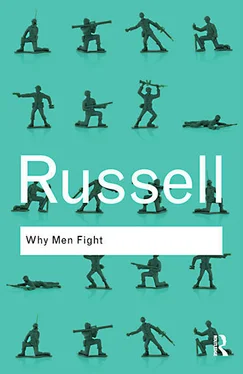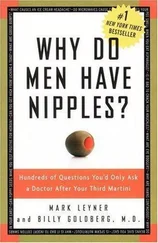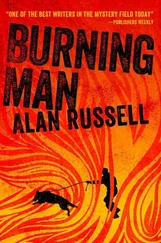Bertrand Russell - Why Men Fight
Здесь есть возможность читать онлайн «Bertrand Russell - Why Men Fight» весь текст электронной книги совершенно бесплатно (целиком полную версию без сокращений). В некоторых случаях можно слушать аудио, скачать через торрент в формате fb2 и присутствует краткое содержание. Город: London, Год выпуска: 2010, ISBN: 2010, Издательство: Routledge, Жанр: Философия, Публицистика, на английском языке. Описание произведения, (предисловие) а так же отзывы посетителей доступны на портале библиотеки ЛибКат.
- Название:Why Men Fight
- Автор:
- Издательство:Routledge
- Жанр:
- Год:2010
- Город:London
- ISBN:978-0-203-86469-2
- Рейтинг книги:3 / 5. Голосов: 1
-
Избранное:Добавить в избранное
- Отзывы:
-
Ваша оценка:
- 60
- 1
- 2
- 3
- 4
- 5
Why Men Fight: краткое содержание, описание и аннотация
Предлагаем к чтению аннотацию, описание, краткое содержание или предисловие (зависит от того, что написал сам автор книги «Why Men Fight»). Если вы не нашли необходимую информацию о книге — напишите в комментариях, мы постараемся отыскать её.
— discusses war, pacifism, reason, impulse and personal liberty, and greatly contributed to Russells fame as a formidable social critic and anti-war activist.
“The supreme principle, both in politics and in private life, should be to promote all that is creative, and so to diminish the impulses and desires that centre around possession.”
Bertrand Russell “Russell is one of the most profound thinkers of the modern age.”
The New York Times
Why Men Fight — читать онлайн бесплатно полную книгу (весь текст) целиком
Ниже представлен текст книги, разбитый по страницам. Система сохранения места последней прочитанной страницы, позволяет с удобством читать онлайн бесплатно книгу «Why Men Fight», без необходимости каждый раз заново искать на чём Вы остановились. Поставьте закладку, и сможете в любой момент перейти на страницу, на которой закончили чтение.
Интервал:
Закладка:
Bertrand Russell
WHY MEN FIGHT
Le souffle, le rhythme, la vraie force populaire manqua à la réaction. Elle eut les rois, les trésors, les armées; elle écrasa les peuples, mais elle resta muette. Elle tua en silence; elle ne put parler qu’avec le canon sur ses horribles champs de bataille. …Tuer quinze millions d’hommes par la faim et l’épée, à la bonne heure, cela se peut. Mais faire un petit chant, un air aimé de tous, voilà ce que nulle machination ne donnera. …Don réservé, béni. …Ce chant peut-être à l’aube jaillira d’un cæur simple, ou l’alouette le trouvera en montant au soleil, de son sillon d’avril.
MICHELETINTRODUCTION
This book is recognized by scholars and laymen alike as Russell’s most important contribution to political philosophy. Written as the losses in the Great War were becoming more and more appalling, he intended to replace what since 1914 he had come to believe was the outmoded nineteenth-century liberalism of Jeremy Bentham and John Stuart Mill. Late in 1915 and early in 1916 Russell advanced a theory of politics based “upon the belief that impulse has more effect than conscious purpose in moulding men’s lives”. He stood by the ambitious analysis developed in the Principles for most of his life, claiming that the book was the “least unsatisfactory” expression of his “own personal religion”. [1] 1 Bertrand Russell, Library of Living Philosophers , vol. 5, The Philosophy of Bertrand Russell , ed. Paul Arthur Schilpp (Evanston, Illinois, 1944), p. 726.
Russell’s ideas took form first as a series of lectures in London early in 1916 on “Principles of Social Reconstruction” and were published in book form under the same title on 13 November 1916. The British edition went through thirteen impressions up to 1954 until a second edition appeared in 1960; the second edition was issued in four impressions, with the last coming in 1989. In America the book was first published in January 1917 under the title Why Men Fight . It went through eight impressions up to 1971.
Little in Russell’s pre-war political experiences had prepared him for the eagerness with which his fellow citizens went to war and became even more militant as the conflict intensified. Thus, in mid-1915, he embarked upon a wholesale re-examination of the theoretical foundation of politics by analysing the roots of social, intellectual and emotional behaviour which, he argued, take their origin either in destructive or possessive impulses or in constructive or creative impulses. For Russell, the key to a healthy society was to fashion family relationships, education and political institutions in such a manner as to promote the development of creative impulses.
These arguments took Russell away from his traditional political values, for up to the outbreak of hostilities he had been a Liberal with a strong streak of the mid-Victorian Radicalism which he had imbibed at Pembroke Lodge. There is some evidence before the war indicating that Russell had thought about modifying the rationalism of the liberal tradition in favour of a psychological theory of impulse. He had been particularly impressed by two writings by the American philosopher, William James, which appeared in 1913 in a posthumous collection of his essays and addresses. The first was his famous essay “The Moral Equivalent of War” and the other a speech given in American, titled “Remarks at the Peace Banquet”. Both argued that most people needed an enemy and wanted war as a release of their vital energies. But James reasoned that since progress demanded peace it was imperative that the enemy not be human. The war reawakened Russell’s interest in James and in the question of the psychological roots of aggression. Indeed, as early as October 1914 the Jamesian influence was evident when Russell wrote his essay “Why Nations Love War” for Norman Angell’s periodical, War and Peace . Later, in Principles of Social Reconstruction , Russell referred to James directly:
His statement of the problem could not be bettered; and so far as I know, he is the only writer who has faced the problem adequately. But his solution is not adequate; perhaps no adequate solution is possible. [2] 2 Principles of Social Reconstruction (London, 1916), p. 67.
Before 1914 Russell had also been introduced to Bernard Hart’s The Psychology of Insanity with its Freudian emphasis on unconscious impulses. Despite such reading, Russell does not appear to have read any of Freud’s works before the end of the war.
Russell initially advanced his ideas on reconstruction in a series of eight lectures presented at the Caxton Hall in London between 18 January and 7 March 1916. The idea for such a lecture series arose out of Russell’s turbulent year-long association with D. H. Lawrence. Both men were horrified by the carnage of the war and what they viewed as its relentless irrationality. Both independently became convinced that the injustices and repressions in modern society had created such deep unhappiness that people needed war to relieve their frustrations. Lady Ottoline Morrell knew Lawrence and admired his novels with their exploration of the emotional springs of aggressive behaviour. She was also well aware that her former lover, Russell, was wrestling with the same issues of why people sought violent solutions to personal and national problems. Since she was convinced that the two men had so much to offer the world, she arranged for them to meet in February 1915.
Atfirst Russell and Lawrence were completely mesmerized by each other and proceeded to plan a major lecturing tour of Britain in the autumn of 1915 with a view to converting the masses to a new understanding of morality. But by the spring of 1915 the deep differences in values and temperament between them had led Lawrence to launch a furious personal assault upon Russell and to mock his ideas as shallow and insidious. He condemned Russell as a bloodless rationalist with a secret desire for violence, while Russell came to see Lawrence as a forerunner of fascism. Although deeply shaken by Lawrence’s indictment, Russell soon recovered his equilibrium and pressed ahead on his own with the lecture scheme.
He contacted C. K. Ogden, the anti-war editor of The Cambridge Review , who agreed to advertise the lecture series and to assist in organizing it. Russell enjoyed giving the lectures and they were well received by the mostly sympathetic audiences of intellectuals, pacifists and radical politicians. In a letter to Lady Ottoline, Lytton Strachey captured the excitement many of them experienced:
Bertie’s lectures help one for they are a wonderful solace and refreshment. One hangs upon his words, and looks forward to them from week to week, and I can’t bear the idea of missing one—I dragged myself to that ghastly Caxton hall yesterday … and it was well worth it. It is splendid the way he sticks at noth-ing—Governments, religions, laws, property, even Good Form itself—down they go like ninepins—it is a charming sight! And then his constructive ideas are very grand; one feels one had always thought something like that—but vaguely and inconclu-sively; and he puts it all together, and builds it up, and plants it down solid and shining before one’s mind. I don’t believe there’s anyone quite so formidable to be found just now upon this earth. (16 February 1916) [3] 3 Michael Holroyd, Lytton Strachey (London, 1968), vol. 2, p. 173.
These lectures, it is well to remember, were given (and some months after published as presented) before the war had reached its most destructive stages. Certainly by early 1916 all hopes for a rapid end to the conflict had faded as, particularly on the Western Front, the struggle had bogged down into the grinding attrition of trench warfare. Just as Russell gave his lectures, the Germans embarked upon their protracted Verdun offensive in an attempt to kill so many Frenchmen as to force a surrender. And on 1 July 1916 the British Army began its own offensive on the Somme, launching what was to be the bloodiest campaign in the country’s history. Moreover, Russell advanced his views on “reconstruc-tion” before the ideological stakes in the war were to become much greater with the outbreak of the Russian Revolution in March 1917 and the American intervention in April of the same year. It is understandable, therefore, that Russell’s suggestions on “reconstruction” were often very general. As he admitted:
Читать дальшеИнтервал:
Закладка:
Похожие книги на «Why Men Fight»
Представляем Вашему вниманию похожие книги на «Why Men Fight» списком для выбора. Мы отобрали схожую по названию и смыслу литературу в надежде предоставить читателям больше вариантов отыскать новые, интересные, ещё непрочитанные произведения.
Обсуждение, отзывы о книге «Why Men Fight» и просто собственные мнения читателей. Оставьте ваши комментарии, напишите, что Вы думаете о произведении, его смысле или главных героях. Укажите что конкретно понравилось, а что нет, и почему Вы так считаете.












